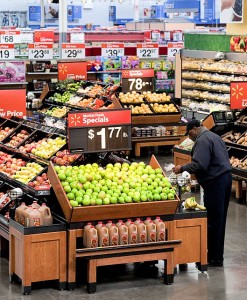As the genetically-altered nature of America’s produce becomes public knowledge, the demand for organic fruits and vegetables has increased. The West Coast is the country’s consistent advocate for hormone-free crops, and now farms in the Northeast are beginning to follow in its footsteps.

Although cities in the Northeast may not seem like the ideal location to initialize the growth of organic produce, Gotham Greens, the urban greenhouse business, is taking strides in introducing New York City to the world of agriculture. Co-Founders Eric Haley and Viraj Puri created the business to implement organic, pesticide-free produce to consumers in the city.
Gotham Greens uses a climate-controlled environment that grows fruits and vegetables year-round. Earlier this year, the organization opened its second greenhouse on the top of a Whole Foods Market in Brooklyn. The 20,000 square-foot greenhouse produces over 200 tons of non-GMO, pesticide-free crops annually. The organic grocery store chains like Whole Foods and Fresh Direct rely on Gotham Greens for their fresh produce, thus calling for heavier demand.
The greenhouse was designed specifically for urban areas where rich soil and vast farmland are scarce. The co-founders developed a hydroponic technique that allows plants to grow without soil, gaining nutrients strictly from a water supply.
In addition to the preservation of soil, the greenhouse recycles all of its water. With droughts becoming more and more problematic throughout the country, this component of the hydroponic method particularly appeals to regions awaiting rainfall for their crops.
Urban agricultural projects like Gotham Greens are gaining popularity with today’s society as the demand for higher quality, better-for-you produce becomes more prominent.
According to the USDA National Agricultural Library, approximately 15 percent of the world’s produce is now grown in urban areas. Since communities around the world are abandoning their rural roots and becoming more urban in nature, the increase in urban agriculture will only continue to increase. With the sustainability of modern technology and the removal of hormone-ridden fruits and vegetables, the concept of urban agriculture appeals to the masses.
Ultimately, Haley and Puri have taken the first step into the future of the farming industry.






